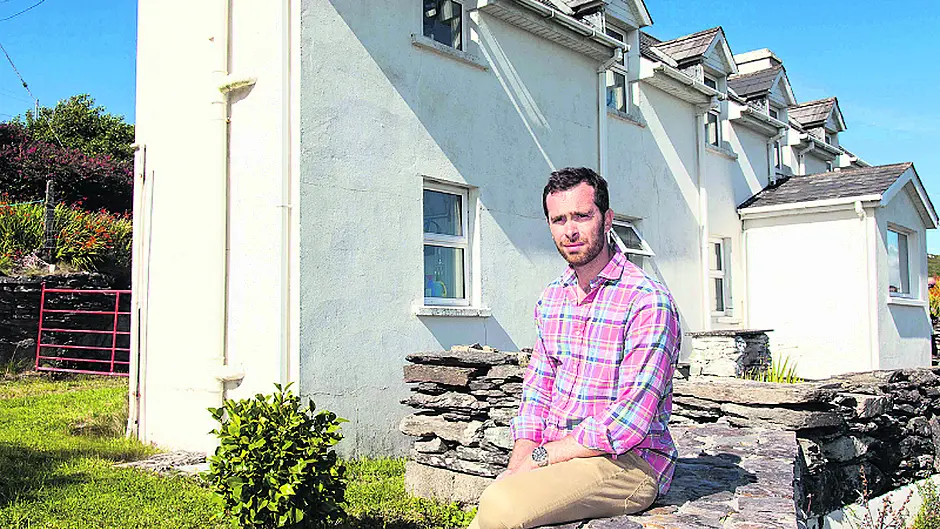A regular visitor to the house where his mother was murdered, Pierre-Louis Baudey-Vignaud tells Jackie Keogh that his trips to Toormore help to keep her memory alive
Pierre-Louis Baudey-Vignaud was just fifteen years old when he heard the news that his mother had been murdered in West Cork.
He is 35 now, but he is back, for a week, at her house in Toormore in Schull with his own family – his beautiful wife, Aurelia, and his utterly charming children Sophie, (4), and Louis, (3).
Pierre-Louis agreed to an interview with The Southern Star following the announcement that the French authorities – who are engaged in an ongoing investigation into the murder of his mother Sophie Toscan du Plantier on December 23rd 1996 – have issued a new European arrest warrant for suspect Ian Bailey.
In the moments before Pierre-Louis comes out to sit on a broad wooden bench overlooking the garden and the rolling green hills, there is a tremendous sense of quiet in the garden at Toormore. The sun is baking hot and beating down on the old stone walls, gravel paths, and rough grass that is liberally dotted with weeds.
But in the heat and silence there is, every now and then, a small rush of wind through the trees. It is not only refreshing; it is reassuring because it sounds like the word ‘shussh.’
The four-year-old Sophie – named for his mother – and Louis come rushing out the back door, as light as lambs on their feet, and make a beeline for the bench. They each hold out a square of chocolate and offer it up to the visitor. And when these morsels are theatrically popped like pills the children giggle and gambol back inside to finish their breakfast.
Sitting together on the bench. A cup of tea in hand. There is an awkward moment. Where to begin? The morning after December 23rd 1996? Pierre-Louis said he was staying with his grandparents, Georges and Marguerite Bouniol, at the time. He said the news then, and now, ‘is more than a nightmare’.
He explained: ‘My parents divorced before my first birthday, so I was very close to my mother. For an only child, the mother is everything. I had been travelling with her and coming here – just the two of us – and we had a very strong relationship.’
His father came to his grandparent’s home that morning and broke the news. Pierre-Louis recalls that the adults, in their wisdom, did the things they normally would do that morning and every morning after. By normalising their days, as best they could, there were able to instil in the teenage boy the belief that ‘life must go on.’
Even so, Pierre-Louis admits: ‘The pain is still there now. You have two arms. Now I have one. It is like a handicap. I lost my mother too young. I had a lot of things to learn from her. Things were unfinished. It’s more than education. It’s the way to live.’
Unlike his French wife, Aurelia, who has flawless English and not even a hint of an accent, Pierre-Louis sometimes speaks in broken sentences. But he can be direct, too. He said: ‘Death is really hard if you are sick, or have an accident, but in my case, somebody decided to do it, to kill her. It is complex and difficult and hard to discuss with people. It is not even that it is painful: it is strange.
‘Coming here is not like a pilgrimage. It is the place I used to come with her. So when I am here, I am with her. I used to cook with my mother in the kitchen and now I want to cook with my daughter and son.’
Pierre-Louis said there is no escaping the fact ‘a nightmare happened here.’ He said that with a nod in the direction of the solemn Celtic cross which marks the place at the end of the rough, fuchsia-lined track where his mother lost her life.
Here, he said, she must have shouted as she received blow after blow. ‘It must have been very hard, but I have to go further. The person who killed my mother took her away, but I will not allow this person to take all my life away. For my kids, being here may be the only way to meet my mother.’
Pierre-Louis said Sophie ‘truly loved this place’, and that they – his children – ‘must learn from that who she was’.
By Irish standards the French can seem stand-offish, but Pierre-Louis is open and warm-hearted.
But not totally. He smiles and says his family come from Lozere in central France, where people pretty much keep themselves to themselves – a philosophy to which he subscribes.
But he is willing to talk to the press. He said: ‘It is not only my story. People must know what happened here and how we can live again.’ If there is a killer living in West Cork, Pierre-Louis said, ‘I have to fight for my family, but also for other women living here.’
Pierre-Louis said the latest development in the legal process emanating from the French authorities offers ‘hope’ because ‘there will be a trial and the professionals will ask the questions – questions to which we need answers.’
Three or four times a year, Pierre-Louis, who is employed in commercial real estate in Paris, brings his family to Toormore. ‘The easy thing to do would be to not come here. But I will wait for justice.’
He said his grandparents Georges Bouniol (90), and Marguerite Bouniol (85) are also waiting for justice. ‘They are old but they live in hope. They have the right to know the end of the story.’
He likes coming to Toormore and West Cork. Aside from bringing him and his family closer to the memory of his mother, he says: ‘I like the calm. I like the mixture of the calm and the stormy breezes.’ For him, it is a place of renewal.
‘I have been coming for thirty years. Here, with my mother, we used to do the simplest things – read, cook, paint this awful table together,’ Pierre-Louis said in reference to an old picnic bench that is now only green in patches.
‘She bought the house as an artistic place. As a film producer, she used to have a big social life in France. This is like her inside home.
‘She used to come alone for reading and writing, and as a place to retreat.’
He said the issuing of the European arrest warrant for suspect Ian Bailey and the news that the French authorities are seeking to extradite him to stand trial in France is welcome.
‘We have been waiting for twenty years for something and now we are sure there will be a trial in the next twelve or twenty-four months. That is important for us because we are approaching the truth.’









